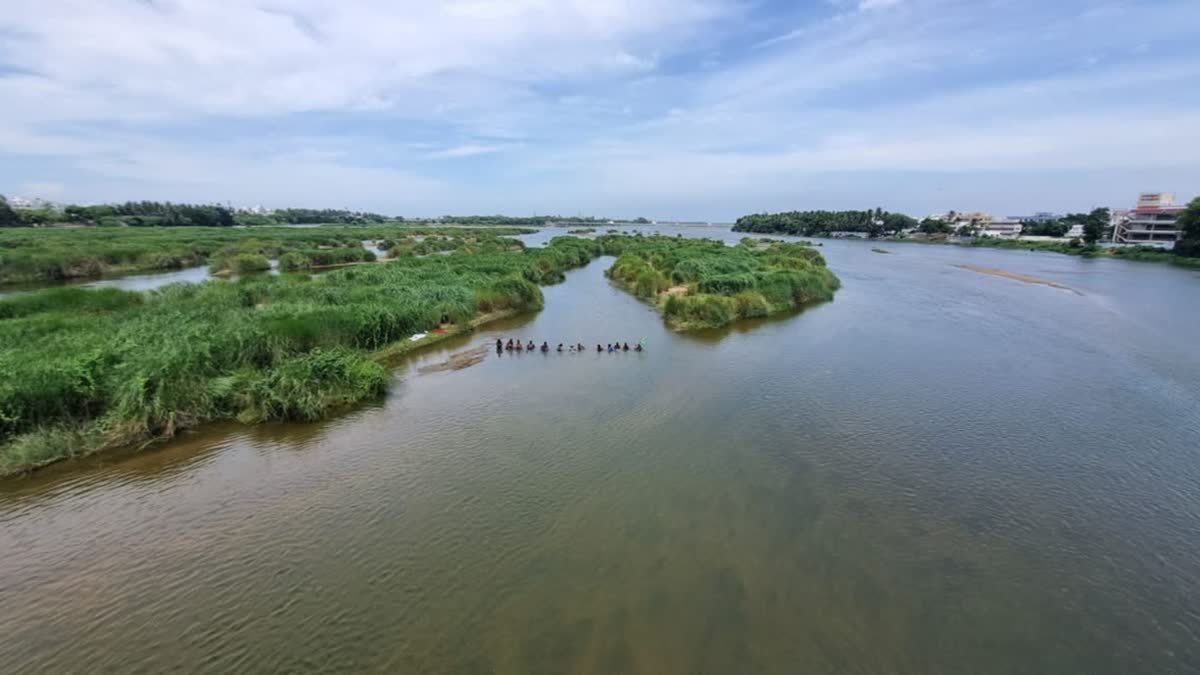Hyderabad: The age-old Cauvery water dispute is heating up yet again. The camaraderie has faded, and the water has ignited the fire and sparked protests among stakeholders. The Cauvery Water Management Authority (CWMA), in its recent directive, mandated Karnataka to release 5,000 cusecs of water to Tamil Nadu over a 15-day period.
This decision has met with vehement opposition from Kannada farmers and the 'Karnataka Rakshana Vedike,' culminating in a disruptive Bengaluru bandh. The ramifications of this protest were far-reaching, affecting educational institutions, hostels, and transportation services. Buses originating from Tamil Nadu were halted at the bordering Krishnagiri district, underscoring the gravity of the situation.
The genesis of this recent flare-up can be traced back to Tamil Nadu's appeal in August, urging expedited water release to support irrigation needs due to the retreating southwest monsoons. Karnataka, however, countered that such a release was unfeasible due to dwindling reservoir supplies, and appealed for Supreme Court intervention.
However, in a significant turn of events, a three-judge bench declined to interfere with the CWMA's decision, setting the stage for widespread protests across Karnataka, led by Cauvery Basin farmers and various organizations. It is crucial to revisit the history of this protracted dispute. A watershed moment occurred in February 2007 when a special tribunal delivered a landmark ruling, ostensibly putting an end to years of strife.
It took an additional eleven years for the Supreme Court to issue a definitive verdict that delineated the quantum of water Karnataka must release to Tamil Nadu annually. The Supreme Court had earlier directed the Centre to establish the Water Management Authority, defining its composition and responsibilities to the minutest detail.
Regrettably, the current situation casts a shadow over the fidelity to the Apex Court's mandate, especially during periods of poor monsoons. As the situation escalates, the CWMA has issued fresh directives amidst the burgeoning public agitation in Karnataka. The key directive entails releasing water at a rate of three thousand cusecs from September 28 to October 15, to assuage tempers on both sides of the Karnataka-Tamil Nadu border.
It remains to be seen whether this compromise can quell the simmering tensions that threaten to disrupt the fragile equilibrium in this longstanding and emotionally charged dispute. Rivers, transcending state boundaries, are treasures that belong to the entire nation, as unequivocally underscored by a Supreme Court pronouncement five years ago.
Also read:Cauvery row: AIADMK accuses CM Stalin of backing Karnataka's Congress government
The ongoing strife amongst governments, each vying for a claim on these waterways, has only fueled crises, serving as a stark reminder of the perils of narrow-minded political brinkmanship. In this escalating tug-of-war, it is paramount to remember that the interests of farmers, regardless of their regional affiliations, must take precedence.
Nature has bestowed us with the invaluable resource of water, a resource that knows no prejudice or bias. Across the globe, nations like Cambodia, Laos, Thailand, and Vietnam have effectively managed their shared Mekong River resources for decades, while in the Nile basin, a remarkable "water symphony" prevails.
In stark contrast, India, a federation of states, continually grapples with water disputes, undermining the very essence of cooperative federalism. Karnataka's recurrent defiance of the Supreme Court's ruling, which mandates a specific allocation of water for lower riparian states even during droughts, stands as a prime example of this discord.
It is imperative that upper riparian states relinquish any sense of superiority, while lower states must not bear the brunt of deprivation. Harmony should be the shared objective. No single state should assume absolute authority over the river that courses through their territory. The Supreme Court's call for an independent body to assess the equitable sharing of interstate rivers underscores the inadequacy of existing institutions, such as the Cauvery Authority.
To rectify this, the establishment of an impartial organization, consisting of learned individuals accountable to the people through Parliament, is imperative. The recommendations of this entity based on scientific principles should serve as the guiding light for all states. Only through the implementation of such a robust mechanism, functioning effectively, can interstate rivers truly become symbols of national unity and integrity.
